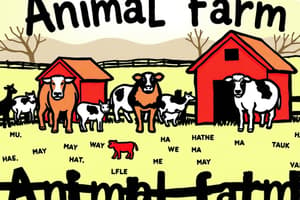Podcast
Questions and Answers
What takes place in Chapter 2 of Animal Farm?
What takes place in Chapter 2 of Animal Farm?
Snowball, Napoleon, and Squealer are introduced and develop Major's ideas into 'Animalism'. The Rebellion takes place almost by accident. The animals take over the farm and set up the Seven Commandments. The first hints that the pigs are not altruistic appear when Napoleon takes away the milk.
Who is Snowball?
Who is Snowball?
He is vivacious, quick in speech, and inventive. He and Napoleon are preeminent among the pigs, responsible for the development of Animalism.
Who is Napoleon and how is he different from Snowball?
Who is Napoleon and how is he different from Snowball?
He is fierce-looking and not much of a talker, known for getting his own way. Unlike Snowball, he takes control of the food supply and demonstrates a more manipulative nature.
Who is Squealer?
Who is Squealer?
What about Boxer and Clover?
What about Boxer and Clover?
What does Mollie's character represent?
What does Mollie's character represent?
What theme is presented when Napoleon removes the milk?
What theme is presented when Napoleon removes the milk?
What does the simplification of Animalism indicate?
What does the simplification of Animalism indicate?
What is the significance of ruling by fear in Animal Farm?
What is the significance of ruling by fear in Animal Farm?
How is literacy related to power in Animal Farm?
How is literacy related to power in Animal Farm?
What does the destruction of the harness-room represent?
What does the destruction of the harness-room represent?
Flashcards are hidden until you start studying
Study Notes
Overview of Chapter 2
- Major's ideas evolve into "Animalism" through the leadership of Snowball, Napoleon, and Squealer.
- The Rebellion occurs almost spontaneously, resulting in the animals taking control of the farm.
- The establishment of the Seven Commandments signals the transformation post-Rebellion.
- Early signs of pig corruption appear when Napoleon seizes the milk for himself.
Character Profiles
-
Snowball
- Described as "vivacious" and "inventive," demonstrating quick thinking and energy.
- He and Napoleon are the most intelligent among the pigs, noteworthy for their leadership post-Rebellion.
- Together with Squealer, they focus on spreading the philosophy of Animalism.
-
Napoleon
- Characterized as "fierce-looking" and assertive, often opting for action over speech.
- He assumes a leadership role, taking control of food supplies while Snowball handles rules.
- Displays ruthlessness as he disregards collective benefit (e.g., the milk incident).
-
Squealer
- Depicted as "small" and "fat," possessing a persuasive and manipulative nature.
- Known for his ability to distort truth—"turn black into white"—to maintain control over the other animals.
-
Boxer and Clover
- Represent loyalty to Animalism; they are loyal followers who cannot think critically for themselves.
- Demonstrated commitment through their participation in meetings and community efforts.
- Boxer symbolizes sacrifice, notably when he tosses his hat to signify dedication to the cause.
-
Mollie
- Portrayed as vain and self-centered, primarily interested in luxuries like sugar and ribbons.
- Exhibits lack of support for the Revolution, revealing her superficial concerns.
Major Themes
-
Power Corrupts
- Napoleon's appropriation of the milk highlights emerging corruption among the pigs, foreshadowing future abuses of power.
-
Propaganda
- The simplification of Animalism into seven easy-to-remember sentences reflects manipulation of the less intelligent animals.
-
Ruling by Fear
- The Commandments are rooted in a fear of humans, with Squealer often using threats of Farmer Jones' return to control the animals.
-
Literacy
- Emphasizes the correlation between knowledge and power; the pigs' literacy gives them an advantage over the other animals, affecting their vulnerability to manipulation.
Style and Irony
- The destruction of symbols representing oppression (e.g., harnesses, ribbons) highlights a naïve hope for freedom.
- Irony manifests as pigs initially reject items of human tyranny but later adopt similar practices (e.g., wearing clothes, wielding whips).
- The Seven Commandments, intended to be strict laws, are altered to serve the pigs' interests, illustrating the cycle of betrayal and subtle manipulation.
- Early destruction of alcohol foreshadows eventual hypocrisy, as the pigs later indulge in it, contrasting their initial views on it being a source of misery.
Studying That Suits You
Use AI to generate personalized quizzes and flashcards to suit your learning preferences.




